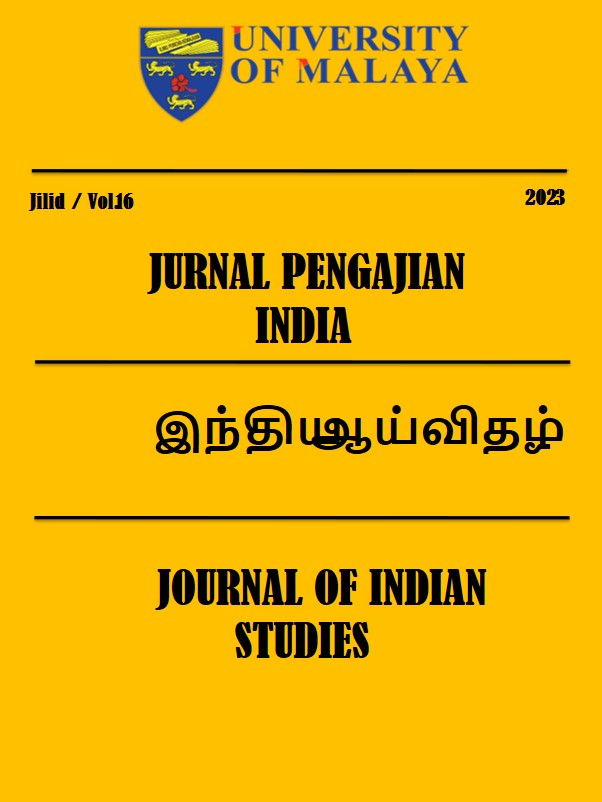Isu Kemiskinan Komuniti Tamil Di Kawasan Setinggan Chennai: Faktor, Tindakan Dan Cabaran Semasa
Keywords:
Poverty, Slum, Human Security, Local authority, Human rights, Kemiskinan, Kawasan Setinggan, Keselamatan Manusia, Pihak Berkuasa Tempatan, Hak Asasi ManusiaAbstract
This study endeavors to assess the pervasive issue of poverty within the Tamil slum community in Chennai, India. With three primary objectives, the research delves into understanding the factors contributing to poverty, evaluating the initiatives taken by stakeholders to alleviate poverty, and appraising the effectiveness of these efforts. Additionally, the study aims to highlight the current challenges faced in addressing poverty within the slum areas of Chennai, drawing on insights from prior research concepts to augment the reader's comprehension. To conduct this investigation, the researcher employed direct observation and interview methods focused on Nochikuppam and Koovam River slums in Chennai. Interviews were conducted with key stakeholders, including the Executive Engineer from the Marina Reconstruction Division of the Tamil Nadu Slum Clearance Board (TNSCB), the Head of the Department of Humanities and Social Sciences at the Indian Institute of Technology (IIT) Madras, and members of the Tamil community residing in Chennai slums. The findings of the study underscore a myriad of factors contributing to the persistence of poverty, with social problems and the prevailing attitude within the population emerging as particularly prominent determinants. Despite various efforts being implemented, the study reveals a significant gap in the effective utilization of resources within these slum communities. The crux of the challenge lies in the seemingly indifferent attitude exhibited by the slum residents themselves. The study's implications emphasize the imperative of addressing cultural factors specific to the slum population to break the cycle of poverty in Chennai's slums. Furthermore, the results call for a nuanced understanding of the cultural dynamics at play to inform targeted interventions. In light of these findings, the study concludes by offering thoughtful suggestions for future researchers, aiming to enhance the completeness and applicability of the results. These recommendations provide a roadmap for addressing the multifaceted challenges associated with poverty in Chennai's slums, with the ultimate goal of fostering sustainable and culturally sensitive solutions.
Kajian ini bertujuan untuk membuat satu penilaian tentang isu kemiskinan yang dialami oleh komuniti Tamil setinggan di Chennai, India. Kajian ini telah dilaksanakan dengan tiga objektif yang utama iaitu, faktor-faktor kemiskinan, usaha pihak berkepentingan dan keberkesanan dalam mengurangkan isu kemiskinan serta cabaran semasa dalam menangani isu kemiskinan kawasan setinggan di Chennai. Beberapa kajian lepas dan konsep kajian turut disampaikan untuk melanjutkan pemahaman dan pengetahuan pembaca. Dalam kajian ini, pengkaji telah menggunakan kaedah pemerhatian dan temu bual secara langsung ke kawasan kajian iaitu kawasan setinggan Nochikuppam dan Koovam River, Chennai. Temu bual telah dijalankan dengan Jurutera Eksekutif, Marina Reconstruction Division, Tamil Nadu Slum Clearance Board (TNSCB) dan Ketua Jabatan Kemanusiaan dan Sains Sosial di India Institute of Technology (IIT) Madras dan komuniti Tamil di kawasan setinggan Chennai. Hasil kajian telah didapati bahawa pelbagai faktor yang mendorong kepada isu kemiskinan ini dan yang paling jelas dilihat adalah faktor masalah sosial dan sikap penduduk itu sendiri. Pelbagai usaha dijalankan, tetapi golongan kawasan setinggan ini tidak digunakan dengan baik. Oleh itu, cabaran isu ini adalah sikap golongan kawasan setinggan itu sendiri yang tidak bertanggungjawab. Implikasi penting daripada hasil kajian ini menunjukkan faktor-faktor budaya penduduk Kawasan setinggan berkaitan harus diberi perhatian untuk mengelakkan isu kemiskinan di kawasan setinggan di Chennai terus berlaku. Cadangan yang bernas juga dikemukakan untuk rujukan kepada para pengkaji akan datang agar hasil yang diperolehi menjadi lebih lengkap.

